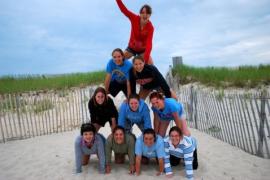James, an adorably awkward first-summer camper, sits on a bench outside Campcraft preparing to take his knife safety test. You tell him to begin, and — biting his lip in concentration — he flips open the large blade.
You try to adopt an encouraging tone, and say: “James, what’s the step before you open the knife?” He stares at you for a moment, and then quotes from memory: “Step number one: Always scan the area around yourself for potential dangers.”
Quietly crestfallen, he mutters to himself: “I’ll never get this right.”
▪ ▪ ▪
Amanda stands at the end of the diving board, fidgeting with her nose plug. She peers dubiously at the lake water — a perilous three feet below — and then looks back at you in obvious uncertainty.
“Remember,” you call out, “make your hands into an arrow over your head, and dive in like a brave fish!”
She dutifully claps her hands over her head, leans tentatively over the end of the board, and prepares a brave dive. At the last second, however, she tries to pull herself back, and tumbles clumsily into a painful splash.
When she comes back to the surface, Amanda fixes you with an angry stare. “I just can’t do it, you know. I just can’t.”
▪ ▪ ▪
Counselors know that campers almost always fail before they succeed. Campers rarely hit the bulls-eye when they loose their first arrow, remember all the words when they sing the camp song, or recite the infield fly rule correctly. (Truthfully, practically no one can recite the infield fly rule correctly.)
And yet, our experience shows us that campers respond to this all-but-certain failure quite differently.
Some campers — the Amandas of the world — find failure debilitating. They get upset or sad; they stop thinking clearly; they give up. You’re unlikely to see disheartened and befuddled James at Campcraft any time soon.
Other campers — James’s brother perhaps, or Amanda’s best friend — respond to failure with marked gusto. You can see that look in their eyes that says, “This is a surprising challenge — and I like a challenge.”
Over the last several decades, psychologists have asked the question, “Why is this so?” Why do some campers (some students, some people) respond to failure by collapsing into a puddle of sad helplessness, while other campers (students, people) respond by stiffening their spines and redoubling their efforts?
If we knew the answer to that question, we might be able to help campers in the first group act more like those in the second group. And, if we can do that, we can do even more than help James pass his knife test. We can, in fact, do what camps are usually great at doing: helping campers face every new challenge with courage and determination.
Mindset
Why do some campers give up in the face of failure, whereas others grin and redouble their efforts? World-famous psychologist Carol Dweck believes she has the answer. With more than four decades of research under her belt, Dweck has found that people typically think about intelligence in one of two ways. Some people think they have a certain amount of intelligence, and that’s that. They might say that their intelligence is fixed; it simply can’t get any bigger. Dweck describes such people as having a “fixed mindset.”
Other people, however, think they have a certain amount of intelligence, and it can increase. Simply put, they believe their intelligence can grow. If they find the right way to work on a problem and just keep working, they’ll be smarter in six months than they are today. Dweck describes these folks as having a “growth mindset” (Dweck, 2007).
Because she has been researching this hypothesis with so many colleagues for so many years, Dweck has reached all sorts of important conclusions. While I can’t cover them all here, three of those conclusions stand out as most important.
One: Fixed and Growth Mindsets Do Exist
As she outlines in her well-known book Mindset: The New Psychology of Success, Dweck and her colleagues have run dozens — even hundreds — of experiments including thousands of people. The evidence showing these mindsets is consistent and impressive. Dweck has worked with youngsters and oldsters; with students and office workers; with people who live in Iowa and people who live in Taiwan. Over and over, researchers have found evidence of these two points of view (Dweck, 2007).
At the same time, mindsets are not some kind of absolute predisposition. True enough, most people tend to fall in one area or the other — that is, believe that their intelligence can’t change or that the right kind of hard work can change it. But these mindsets can change, and can be changed. (More on this crucial point to come.)
Equally important, people might have a fixed mindset in one setting and a growth mindset in another. For example, I might be a primarily fixed-mindset kind of guy. But, if I’m unusually good at cooking, I might have a growth mindset about baking — even if my first few attempts at making croissant didn’t work out so well.
Two: Fixed and Growth Mindsets Do Shape Reactions to Failure
Campers who have a fixed mindset tend to give up quickly when they struggle. It seems that James, for example, is having a mental discussion that goes like this: “I can’t remember all these knife-test instructions, and I know that I just don’t get better at hard things. There’s no reason to keep going — I’ll save myself some time if I just give up now.”
In his mind, James is being practical by giving up. Informed by his fixed mindset, he knows he can’t improve, and so doesn’t want to waste effort on something that’s bound to fail.
On the other hand, campers who have a growth mindset tend to push on despite their struggle. In some cases, they even enjoy it. (In one of Dweck’s oft-told stories, a growth-mindset fifth-grader looked up at her after he got an answer wrong and said, “I was hoping this would be a challenge!”)
Amanda’s best friend, Kiara, had her share of belly-flops when learning to dive. But, unlike Amanda, Kiara talks to herself with a growth-mindset point of view: “Okay, that dive wasn’t much better. The counselor said to let my legs go up when my head goes down, so I’ll focus on that during the next dive.”
Notice that Kiara doesn’t really focus on the fact that she made a mistake. From a growth-mindset perspective, she has gotten useful feedback on how to improve, and she keeps her attention there. Someone somewhere might call her last dive a mistake, but that way of thinking isn’t very interesting to her. Instead, like most people with a growth-mindset, she focuses on what she can do differently and what she can do better. Because of this change in focus, Kiara is likely to learn more and improve faster.
As the saying goes, “Whether you think you can or you think you can’t, you’re right.”
Three: Mindsets Can Change
In fact, counselors can change them.
As we’ve seen, mindsets exist, but they’re not absolute. Campers might have a different mindset during different activities. Because Kiara is good at soccer, she’s used to making her body do what she wants it to do. And so, no surprise, she has a growth mindset while learning to dive.
However, if she typically struggles in school to memorize new information, she might not believe that she’ll ever learn the names of all those leaves and all those trees. Like her friend Amanda on the diving board, Kiara might have a fixed mindset while at Nature Studies.
The Right Compliment
Mindsets change not only because of circumstances, but also because of adults. Counselors might unintentionally reinforce a fixed mindset. But, with a little insight and a little practice, we can intentionally promote a growth mindset.
It’s crucial to compliment campers correctly.
Imagine ten-year-old Elijah clambered into a canoe and learned the J-stroke unusually quickly. As an experienced boating counselor, I know it’s important to reinforce his success. I could compliment him like this: “Elijah, that’s fantastic. You’re clearly a natural in a canoe!”
Or I could compliment him like this: “Elijah, that’s fantastic. You rotated your wrist at just the right moment!”
Notice the key difference between these compliments. The first one compliments Elijah for who he is — “a natural.” The second compliments him for what he did — he rotated his wrist. If I call Elijah “a natural,” I’m suggesting that there are two kinds of campers — those who are naturals, and those who are not. For the time being, Elijah is happy to get this news, because he’s in the good group. However, my compliment has a fixed-mindset implication. Presumably, those who aren’t naturals can’t become naturals. Next week, if Elijah struggles with a draw stroke, he might well conclude that he isn’t really a natural after all — and will never become one.
In this way, my compliment — which was intended to be helpful — turns out in the long run to be destructive. If campers hear enough fixed-mindset compliments — “smart, talented, gifted, brilliant, genius” — they will increasingly adopt a fixed mindset themselves.
The malign power of fixed-mindset compliments isn’t simply a hypothesis. Dweck and fellow researcher Claudia Mueller tested this idea for almost two decades and found precisely these results. In their research, children who got fixed-mindset compliments were more upset by mistakes, thought less strategically, and gave up more easily than children given growth-mindset compliments. Amazingly, they were even likelier to lie about their work, claiming to have higher levels of success than they really did.
Let’s go back to my second compliment: “You rotated your wrist at just the right moment!” This kind of praise establishes a very different mental paradigm. All campers can turn their wrists at the right time; they just need to focus on that skill and keep practicing. Thus, I’m not praising Elijah for the kind of person he is (fixed mindset), but the action he performed (growth mindset).
Growth-mindset compliments typically include more useful detail than fixed-mindset ones. After all, I can say “You’re just awesome!” in almost any situation. But the compliment “Great work! You remembered to square up as the ball came toward you” makes sense only when campers are learning fielding skills. For this reason, growth-mindset compliments help both by fostering campers’ determination, and by reminding them of the key skill in need of attention.
Controversy
Dweck’s study of compliments has led to some controversy.
First, the self-esteem movement got adults in the habit of complimenting children for practically everything. Dweck’s advice pushes back against this idea. Her research — as well as research of other scholars — has shown the wrong kind of compliment doesn’t boost self-esteem. Instead, it promotes a fixed mindset and demotivates campers.
Second, plenty of Dweck’s readers have a straight-forward objection: It’s simply true that some people are naturally better at singing, hitting a baseball, or multiplying two-digit numbers. If Elijah is a natural at canoeing, why not just say so?
Because telling him that doesn’t help. Such feedback promotes passivity: “If I’m a natural,” Elijah might reasonably say to himself, “I don’t need to practice. I’ll just get it.”
Such feedback discourages adventurousness and creates fear of mistakes. If Elijah believes he’s a natural, then even a small failure undermines his belief. For this reason, he’s likely to avoid any challenging situation — or any frank feedback — that might alert him to weaknesses.
Such feedback ultimately encourages Elijah to give up. Campers with a fixed mindset attribute any failure to a basic lack of ability, so once they fail they stop trying. (Campers with a growth mindset typically attribute failure to lack of effort, so when they fail they work harder.)
Even if you believe that some people are naturally better than others at various tasks, decades of research clearly show that fixed-mindset compliments discourage and demotivate.
The central message is clear: James can pass his knife test. Amanda can learn to dive head first. And our camps can help them do so by promoting growth mindset.
Reference
Dweck, C. (2007) Mindset: The new psychology of success. New York, NY: Ballantine Books.
Photo courtesy of Girl Scouts of the Chesapeake Bay, Newark, Delaware
Author, teacher, camp counselor, national and international speaker, Andrew Watson, MA, M Ed, has been connecting brain research with schools and camps for the better part of a decade. A one-time dean of faculty and an award-winning teacher with 16 years of experience, Andrew now presents on the practical uses of neuroscience and psychology research. Author of Learning Begins and founder and president of Translate the Brain, an educational consultancy, he has worked in dozens of schools in the US, Finland, South Africa, and beyond.



